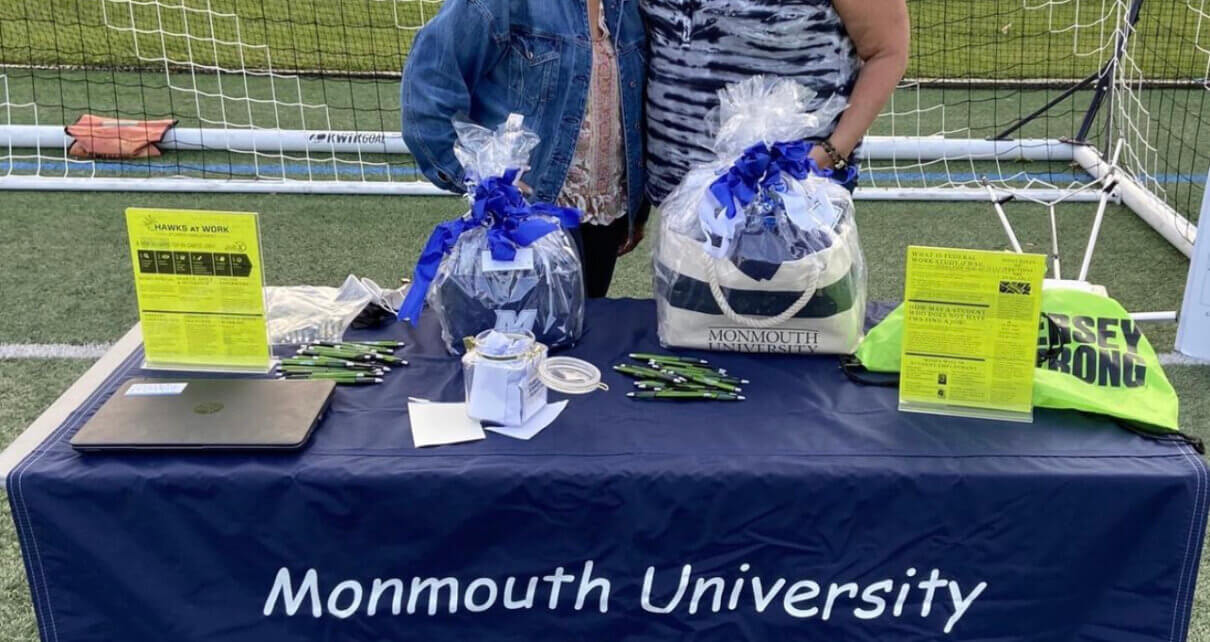Being a college student can make it hard to find a job outside of campus. When it comes to the challenges of having no transportation, chaotic class schedules, or even hours of studying, having an on-campus job can be lifesaving. According to Sandy Brown, Assistant Director of Human Resources for Student Employment, Monmouth University offers over 100 on-campus jobs for their students awarded
with
Federal Work Study on JobX, a job posting website. Both undergraduate and graduate students are given the opportunity to apply for jobs that are only steps away from their dorms, fit their schedules, and in some cases, benefit their majors. Having the option of working on campus diminishes the extra stress on college students’
experience and gives them the chance to make a profit while focusing on their studies.
Student employees can work up to 20 hours per week. According to Brown, it is “a great opportunity at the current New Jersey hourly rate of $14.13 to generate bi-weekly income while developing professional skills to enhance their resume.”
The job application and hiring process consists of several steps. Students are unable to work on campus without filing, or being exempt from filing if they are a graduate student or international student, by the Financial Aid Office. Undergraduate students must complete the Free Application for Federal Student Aid form, also known as FAFSA, to determine whether they are eligible for
Federal Work Study or to get employment in student help. After confirming their eligibility, students can apply for jobs through JobX. International students, however, do not file a FAFSA because they are not eligible for Federal Work Study. Instead, they must apply to ‘student help’ postings on JobX.
“Apply to various positions on campus and have a current resume on hand to complete application and/or attach to submission,” suggested Brown. “Don’t give up on working. Didn’t hear back from the hiring official? Follow-up with a phone call or email conveying your interest in the position and ask for the opportunity to have an interview.”
Getting employment on campus is not as simple as applying for a job and working. To be hired, you must be interviewed and within that interview, it is important to display the qualities that supervisors look for.
“Each department is looking for a different set of soft skills such as positive attitude, motivation, commitment, and enthusiasm,” explained Brown. “Future employers are looking for strong core competencies in oral and written communication, collaboration, digital technology, leadership, and diversity skills, [which] can be highlighted on applications and students can list Monmouth as a reputable resource as work experience.”
Students who display these aspects are more likely to get employment on campus. Not only are these qualities important for student employees at Monmouth University to have, but they are important to maintain for future job opportunities.
“We ask that our student employees be responsible and professional, as they are representing Monmouth University in their daily roles as student employees,” Brown said.
“Staying organized and managing your time wisely is a necessity when it comes to getting employment on campus,” advised Gianna Krezel, a freshman music industry student.
“Employers look for people who are responsible. So, making use of your on-campus job by practicing that responsibility employers look for, with the help of your supervisor, will be beneficial in the long run.”
After being interviewed and selected as a hire by a supervisor, students must complete the online payroll forms to initiate the onboarding process. In order to work they must present their original documents, for Form I9, to the Student Employment office to confirm work eligibility. International students must also provide their international documents to the Student Employment office but are required to present their social security cards as well. Once the documents have been shown and put into the system, students can then complete the assigned compliance trainings and start work.
“The trainings were straightforward. I received an email listing specific trainings required for my job. They were super easy and I even got paid for the time it took me to complete them,” said Krezel.
Krezel continued, “I received emails from Student Employment providing the step-by-step process of what I needed to do along the way to get employment on campus.”
After completing the job application and hiring process, student employees must talk with their supervisor to create their schedules and begin working. Working on campus allows for more flexibility within schedules. Students are able to work in between their classes and in some cases, engage in their studies while at work.
“Being employed has helped me a lot. Extra money is always great, but they always remind me to put my studies first. They know we’re student employees and they are flexible with schedules for us to succeed academically,” said Leslie Fuentes, a sophomore early childhood and education student. “I would strongly encourage students to apply to on-campus jobs because they are so convenient…you get to make connections with different supervisors that could help you in the long run. They always have all types of jobs which can be great for any major. It’s really easy to apply and gain experience, which most jobs are looking for when we graduate.”
Supervisors, like Brown, understand the importance of academics for their student employees. Not only does she consider her employees’ academics, but also their extracurricular activities and priorities.
“College students are very busy with academics and extracurricular activities. Having a part- time job on campus allows a great deal of flexibility working around classes and ease of accessibility being located on campus,” Brown shared.
Student Employees play a key role in the success of departments and the University as whole. Each job, whether it’s related to academics or not, provides students with workplace skills that are invaluable when searching for careers after graduation.




